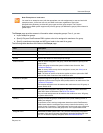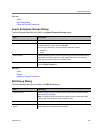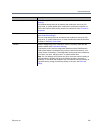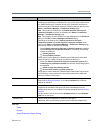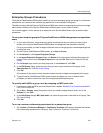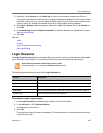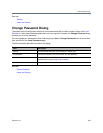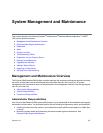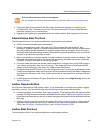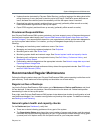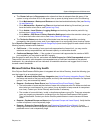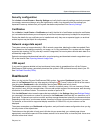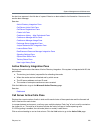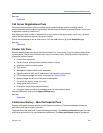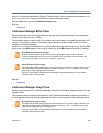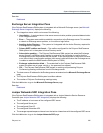
System Management and Maintenance
Polycom, Inc. 338
● Using the system tools provided to aid with system and network diagnostics, monitoring, and
troubleshooting. See Troubleshooting Utilities. Should the need arise, Polycom Global Services
personnel may ask you to run these tools.
● Upgrading the system when upgrades/patches are made available. See Upgrading the Software.
Administrative Best Practices
The following are some of our recommendations for administrative best practices:
● Perform the recommended regular maintenance.
● Except in emergencies or when instructed to by Polycom Global Services personnel, don’t
reconfigure, install an upgrade, or restore a backup when there are active calls and conferences on
the system. Many of these operations will require a system restart to complete, which will result in
these calls and conferences being dropped. Before performing these operations, busy out all MCUs
and wait for all conferencing activity to cease.
● Before you reconfigure, install an upgrade, or restore a backup, manually create a new backup. Then
download and archive this backup in the event that something unforeseen occurs and it becomes
necessary to restore the system to a known good state.
● For proper name resolution and smooth network operations, configure two or more DNS servers in
your network configuration (see Network Settings). This allows the Polycom RealPresence DMA
system to function properly in the event of a single external DNS failure.
● Configure at least one NTP server in your time configuration (see Time Settings) and preferably three.
Proper time management helps ensure that your cluster operates efficiently and helps in diagnosing
any issues that may arise in the future. Proper system time is also essential for accurate audit and
CDR data.
● Unless otherwise instructed by Polycom Global Services, always use the High Security setting. See
Security Settings.
Auditor Responsibilities
As a Polycom RealPresence DMA system auditor, you’re responsible for managing the system’s logging
and history retention. You should be familiar with the following configurations and operations:
● Configuring logging for the system. See Logging Settings. These settings affect the number and the
contents of the log archives available for download from the system. See System Log Files. Polycom
Global Services personnel may ask you to adjust the logging configuration and/or download and send
them logs.
● Configuring history retention levels for the system. See History Retention Settings. These settings
affect how much system activity history is retained on the system and available for download as
CDRs. See Call History, Conference History, and Call Detail Records (CDRs).
Auditor Best Practices
The following are some of our recommendations for auditing best practices:
Note: System maintenance tasks can be delegated
You can delegate some of the maintenance tasks to a provisioner. See Provisioner Responsibilities.



